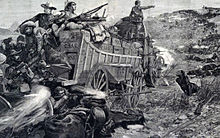Matabeleland
Other ethnic groups who inhabit parts of Matabeleland include the Tonga, Bakalanga, Venda, Nambya, Khoisan, Xhosa, Sotho, Tswana, and Tsonga.The capital and largest city is Bulawayo, other notable towns are Plumtree, Victoria Falls, Beitbridge, Lupane, Esigodini, Hwange Gwanda and Maphisa.Mzilikazi, a former general under Shaka, organised this ethnically diverse nation into a militaristic system of regimental towns and established his capital at Bulawayo ("the place of killing").The first decisive battle was fought on 1 November 1893, when a laager was attacked on open ground near the Bembesi River by Imbizo and Ingubo regiments.This incident had a lasting influence on Matabeleland nationalism and spirit of resistance and the colonists who died in this battle are buried at Matobo Hills along with Jameson and Cecil Rhodes.In white Rhodesian history, Wilson's battle takes on the status of General Custer's stand at Little Big Horn in the United States.Lobengula died in January 1894, under mysterious circumstances; within a few short months the British South Africa Company controlled Matabeleland, and white settlers continued to arrive.He convinced the Ndebele that the white settlers (almost 4,000 strong by then) were responsible for the drought, locust plagues and the cattle disease rinderpest ravaging the country at the time.The British would immediately send troops to suppress the Ndebele and the Shona, only it would take months and cost many hundreds of lives before the territory would be once again be at peace.Shortly after learning of the assassination of Mlimo at the hands of the American scout Frederick Russell Burnham, Cecil Rhodes walked unarmed into the Ndebele stronghold in Matobo Hills and persuaded the impi to lay down their arms, thus bringing the war to a close in October 1896.[7] Later, Baden-Powell wrote a number of books on Scouting, and even started to train and make use of adolescent boys, most famously during the Siege of Mafeking, during the Second Boer War.They are said to have been carried out by some military elements mainly alleged to be a now disbanded fifth brigade, a paramilitary force that was trained in North Korea, from early 1983 to late 1987.[citation needed] Greater Matabeleland has rich central plains, watered by tributaries of the Zambezi and Limpopo rivers, allowing it to sustain cattle and consistently produce large amounts of cotton and maize.


NdebeleZimbabweMatabeleland NorthBulawayoMatabeleland SouthLimpopoZambeziNdebele peoplewere calledBakalangaNambyaKhoisanTswanaTsongaPlumtreeVictoria FallsBeitbridgeLupaneEsigodiniHwangeGwandaMaphisaMatabeleland Zambezi Water ProjectHistory of ZimbabweLeopard's KopjeMapungubwe KingdomZimbabwe KingdomMutapa KingdomButua KingdomWhite settlement pre-1923Rozvi EmpireMthwakaziRudd ConcessionBSA Company ruleFirst Matabele WarSecond Matabele WarWorld War I involvementColony of Southern RhodesiaWorld War II involvementMalayan EmergencyinvolvementFederation with NorthernRhodesia and NyasalandRhodesian Bush WarUnilateral Declaration ofIndependence (UDI)RhodesiaZimbabwe-RhodesiaLancaster House AgreementBritish DependencyGukurahundiSecond Congo WarCoup d'étatMapungubweNdebele KingdomTransvaalLobengulaCecil RhodesBritish South Africa CompanyPioneer ColumnHarareMashonalandprotectoratesMasvingoResident CommissionerBechuanaland ProtectorateBotswanaTati Concessions LandRichard Caton WoodvillelaagerBritishSir John WilloughbyartilleryMaxim gunsGardner gunHotchkiss gunBattle of the ShanganiBritish South Africa PoliceLeander Starr JamesonShangani PatrolAllan WilsonShangani riverFrederick Russell BurnhamMatobo HillsRhodesianGeneral CusterLittle Big HornChimurengarinderpestTransvaal RepublicJameson RaidBaden-PowellBurnhamRobert Baden-PowellScout MovementwoodcraftMafekingfrontiersmenAmerican Old WestIndigenous peoples of the AmericasscoutcraftScoutingBritish Armytrackingfieldcraftcampaign hatSiege of MafekingSecond Boer WarSouthern RhodesiaFederation of Rhodesia and NyasalandBritish subjectsIan SmithPortugalZimbabwe African People's UnionNdebele languageRobert MugabeJoshua NkomoNorthern Ndebele peopleInternational Association of Genocide Scholarsland grabbingKalangaMatoposMatabeleland football teamJournal of Southern African StudiesRoutledgeBibcodeFarwell, ByronBurnham, Frederick RussellBoys' Life